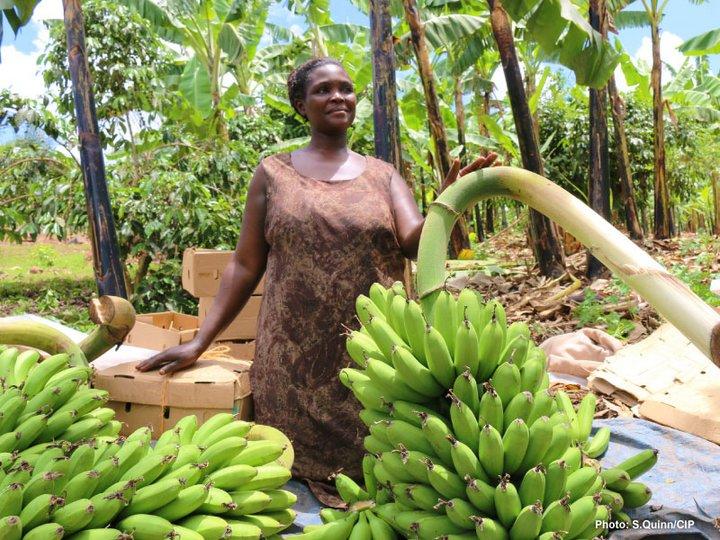Press and News Innovation injects income opportunities into the banana value chain

As reported in their latest annual report, the CGIAR Research Program on Roots, Tubers and Bananas (RTB) has been busy working with local partners along the entire cooking banana value chain in Uganda. The research partners are testing strategies to reduce post-harvest loss and differentiate products in order to improve incomes and food security.
As reported in their latest annual report, the CGIAR Research Program on Roots, Tubers and Bananas (RTB) has been busy working with local partners along the entire cooking banana value chain in Uganda. The research partners are testing strategies to reduce post-harvest loss and differentiate products in order to improve incomes and food security.
In Uganda, cooking banana is not only the main staple crop, but also an important source of income for farmers and other value chain actors. Sadly, a significant portion of cooking banana production is lost or damaged due to the fruit’s short shelf life and poor handling.
A team of researchers from Bioversity International, CIRAD, the International Institute of Tropical Agriculture (IITA) and Uganda’s National Agricultural Research Organization (NARO) joined farmers, transporters, vendors and exporters in Central and Western Uganda to find ways to reduce loss and increase the earnings of smallholders and cooking banana sellers – most of whom are women. According to a 2015 market study, women are disproportionately affected by postharvest loss since they are largely responsible for retailing the crop and frequently have to sell damaged bananas for low prices. This collaboration is one of four sub-projects under ‘Expanding Utilization of RTB and Reducing Their Postharvest Losses’ (RTB-ENDURE), a three-year initiative working with banana, cassava, potato and sweetpotato in Uganda, funded by the European Union and the International Fund for Agricultural Development.
Because losses are highest during peak harvest, when the banana supply surpasses demand, RTB researchers are testing staggered planting systems, with 266 farmers trained in staggered planting in 2015. They also identified cooking banana varieties that produce robust fruit with a longer shelf life that is less susceptible to damage. Although there is market demand for these kinds of varieties, few farmers grow them. The RTB-ENDURE banana team worked with smallholders to select four such varieties for planting and provided training in macro-propagation of planting material and better agronomic practices to boost farm production.
As explained by Bioversity International researcher and RTB-ENDURE sub-project coordinator Enoch Kikulwe, farmer groups built propagation chambers where clean planting material for the selected varieties provided by NARO is multiplied for distribution to smallholders. He cited the example of a group of women in Lwakalolo Parish, in Ddwaniro Sub-County, who also use their macro-propagation chamber for training other farmers. Researchers also helped farmers establish 10 mother gardens – four of which are managed by women – where they grow the new varieties.
RTB researchers are also testing ways to increase retail margins by diversifying the way cooking bananas are sold, and providing business training to women who recently moved into wholesale and helping them gain access to credit, markets in Kampala and banana exporters.
Kikulwe explained that the women the project has helped move into wholesale will purchase the bananas with longer shelf life from participating farmers, which should improve smallholder incomes while reducing the risk of fruit loss for the wholesalers and vendors they sell to. This and other innovations facilitated by RTB-ENDURE have the potential to be scaled out within Uganda and beyond.
Read the original article Banana value chain innovations create income opportunities for farmers and retailers
Photo: Banana seller at a market in Uganda. Credit: CIP/S. Quinn
